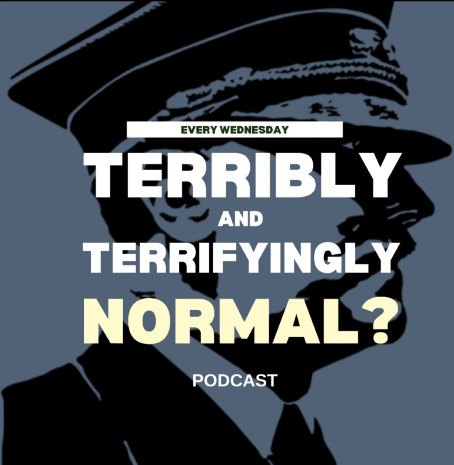Better understanding the causes of mass atrocities in an increasingly violent world.
Open Research objectives/practices
Making the outputs of research freely accessible.

Introduction
Terribly and Terrifyingly Normal? is a podcast series in which we invite other scholars to discuss issues and topics that can help our listeners to better understand why people commit mass atrocities. The podcast series was launched last year and has 25 episodes so far. Guests have come from many different disciplines such as law, criminology, social science, psychology, philosophy, anthropology, political science, history, Middle eastern studies, terrorism studies and genocide studies. The guests are scholars from the RUG or other universities in the Netherlands or abroad. The series is in English and freely available on all podcast platforms.
Motivation
The reason to start the podcast series was the publication of my book Perpetrators of Mass atrocities - Terribly and Terrifyingly Normal? which is based on more than 30 years of research. I was looking for additional ways to disseminate this knowledge as it is very relevant for the general public in an era in which the violence in the Middle East and other parts of the world has reached dangerous levels.
With the podcast series we found a way to share the knowledge and insights I gained in a free and accessible way that appeals to especially young people around the world.
The podcast series provided us with means and the opportunity to invite many different scholars, have an online discussion and make episodes that can be used and re-used as learning material supporting my teaching in a way that would otherwise not have been possible. In my lectures I often refer to the podcast series and I know many other teachers at other universities and in other countries also do so. Next to that it is a means to let other people outside of university to be able to listen to the podcasts.
The impact and spin off has been huge. We now have close to 700 followers in many different places of the world and our episodes have been listened to more than 9000 times. It led to invitations to appear in other freely available podcasts (Universiteit van Nederland; Auxoro podcast, Asymmetrical haircuts) with a huge outreach; to give webinars and public lectures such as in the series Science & Cocktails in Paradiso Amsterdam as well as in Copenhagen; Noorderzon festival and Geschiedenis festival as well as lecture for professionals such as lawyers at the Asser Institure and the police some of which have been recorded and have also been made publicly available (see links below). The mentioned events had audiences between 150 and 900 people. The publicity also lead to many interviews for magazines such as: Psychologie Magazine; Historisch Nieuwsblad;Wordt Vervolgd; Justice info; Dagblad van het Noorden en Eenvandaag.
The podcast played a crucial role in all this but the combination with the public lectures and interviews made that they all three reinforced each other in drawing attention to the book and more so the research findings which then lead to an ever-increasing dissemination.
Lessons learned
The podcast is a great and fulfilling way to disseminate knowledge and we ourselves learned a lot from it. It is however a lot of work which I can still do as part of my work, but the host, Nicola Quaedvlieg who was a teacher at the faculty of behavioural and social sciences now has to do alongside his full-time job in journalism which is difficult: especially the time-consuming editing process. The success of the podcast, however, created expectations which makes us want to professionalize further but it is hard to find the time and resources to do so.
URLs, references and further information
-
Podcast series Terribly and Terrifyingly normal: https://open.spotify.com/show/2Bt5Wg5nbekeSo8UBDI5MY
-
The book: Perpetrators of Mass atrocities - Terribly and Terrifyingly Normal? (Routledge 2024) https://www.routledge.com/Perpetrators-of-Mass-Atrocities-Terribly-and-Terrifyingly-Normal/Smeulers/p/book/9781032568027?srsltid=AfmBOooZFcY-th5c8oAbsSs-iwJYvjZmqjuQ1rv9DE6x373CDNrN47qd
Other podcasts:
-
Universiteit van Nederland; https://www.youtube.com/watch?v=R6H-MvJ2OCk
Public lectures available on internet:
-
Science & Cocktails, Paradiso Amsterdam: https://www.youtube.com/watch?v=LRGD6Enftw8
-
Asser Institute: https://www.youtube.com/watch?v=U3EAlx9juZE
-
Police academy: https://www.youtube.com/watch?v=PJ16GLoqBSA (as off min. 53)
